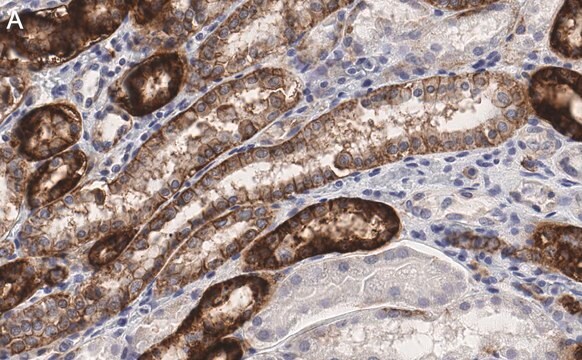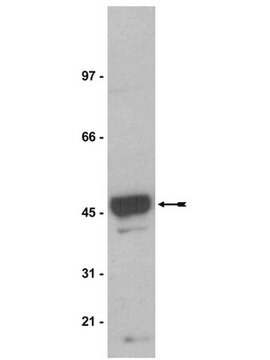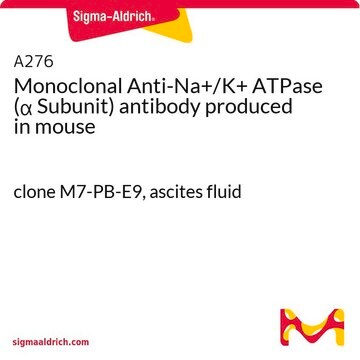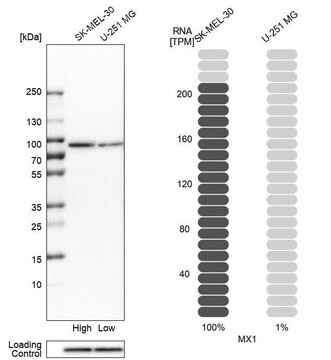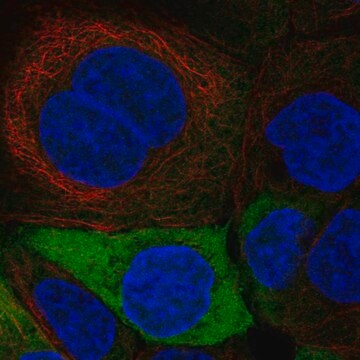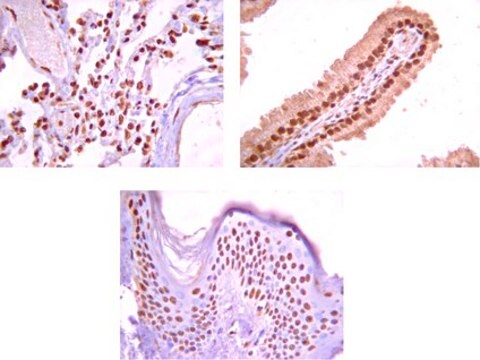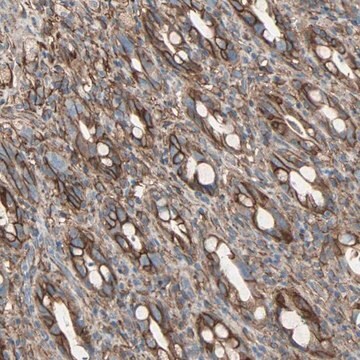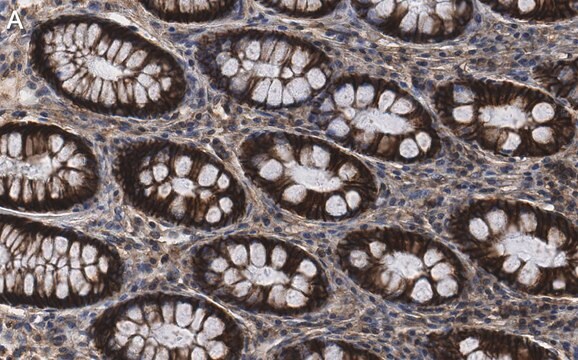추천 제품
생물학적 소스
rabbit
Quality Level
결합
unconjugated
항체 형태
affinity isolated antibody
항체 생산 유형
primary antibodies
클론
polyclonal
제품 라인
Prestige Antibodies® Powered by Atlas Antibodies
형태
buffered aqueous glycerol solution
종 반응성
human
기술
immunofluorescence: 0.25-2 μg/mL
immunohistochemistry: 1:200-1:500
UniProt 수납 번호
배송 상태
wet ice
저장 온도
−20°C
타겟 번역 후 변형
unmodified
유전자 정보
human ... EPB41L2(2037)
면역원
Band 41-like protein 2 recombinant protein epitope signature tag (PrEST)
Sequence
ELKRNFMESTPEPRPNEWEKRRITPLSLQTQGSSHETLNIVEEKKRAEVGKDERVITEEEVEEE
Sequence
ELKRNFMESTPEPRPNEWEKRRITPLSLQTQGSSHETLNIVEEKKRAEVGKDERVITEEEVEEE
애플리케이션
All Prestige Antibodies Powered by Atlas Antibodies are developed and validated by the Human Protein Atlas (HPA) project and as a result, are supported by the most extensive characterization in the industry.
The Human Protein Atlas project can be subdivided into three efforts: Human Tissue Atlas, Cancer Atlas, and Human Cell Atlas. The antibodies that have been generated in support of the Tissue and Cancer Atlas projects have been tested by immunohistochemistry against hundreds of normal and disease tissues and through the recent efforts of the Human Cell Atlas project, many have been characterized by immunofluorescence to map the human proteome not only at the tissue level but now at the subcellular level. These images and the collection of this vast data set can be viewed on the Human Protein Atlas (HPA) site by clicking on the Image Gallery link. We also provide Prestige Antibodies® protocols and other useful information.
The Human Protein Atlas project can be subdivided into three efforts: Human Tissue Atlas, Cancer Atlas, and Human Cell Atlas. The antibodies that have been generated in support of the Tissue and Cancer Atlas projects have been tested by immunohistochemistry against hundreds of normal and disease tissues and through the recent efforts of the Human Cell Atlas project, many have been characterized by immunofluorescence to map the human proteome not only at the tissue level but now at the subcellular level. These images and the collection of this vast data set can be viewed on the Human Protein Atlas (HPA) site by clicking on the Image Gallery link. We also provide Prestige Antibodies® protocols and other useful information.
생화학적/생리학적 작용
Band 4.1-like protein 2 is a protein encoded by the EPB41L2 gene in humans. It is referred as 4.1G and 4.1-G. It is widely expressed member of the protein 4.1 family of membrane skeletal proteins. It is mapped to human chromosome 6q23 and is widely expressed among human tissues. It is known to stabilize cellular structures and proteins at the plasma membrane. The plasma membrane-associated protein regulates GPCR-mediated G(s) signaling by suppressing adenylyl cyclase-mediated cAMP production. It is found to mediate receptor/cytoskeleton interactions. The protein is known to associate with the membrane-associated guanylate kinase homologue.
특징 및 장점
Prestige Antibodies® are highly characterized and extensively validated antibodies with the added benefit of all available characterization data for each target being accessible via the Human Protein Atlas portal linked just below the product name at the top of this page. The uniqueness and low cross-reactivity of the Prestige Antibodies® to other proteins are due to a thorough selection of antigen regions, affinity purification, and stringent selection. Prestige antigen controls are available for every corresponding Prestige Antibody and can be found in the linkage section.
Every Prestige Antibody is tested in the following ways:
Every Prestige Antibody is tested in the following ways:
- IHC tissue array of 44 normal human tissues and 20 of the most common cancer type tissues.
- Protein array of 364 human recombinant protein fragments.
결합
Corresponding Antigen APREST86801
물리적 형태
Solution in phosphate-buffered saline, pH 7.2, containing 40% glycerol and 0.02% sodium azide
법적 정보
Prestige Antibodies is a registered trademark of Merck KGaA, Darmstadt, Germany
면책조항
Unless otherwise stated in our catalog or other company documentation accompanying the product(s), our products are intended for research use only and are not to be used for any other purpose, which includes but is not limited to, unauthorized commercial uses, in vitro diagnostic uses, ex vivo or in vivo therapeutic uses or any type of consumption or application to humans or animals.
적합한 제품을 찾을 수 없으신가요?
당사의 제품 선택기 도구.을(를) 시도해 보세요.
Storage Class Code
10 - Combustible liquids
WGK
WGK 1
Flash Point (°F)
Not applicable
Flash Point (°C)
Not applicable
개인 보호 장비
Eyeshields, Gloves, multi-purpose combination respirator cartridge (US)
시험 성적서(COA)
제품의 로트/배치 번호를 입력하여 시험 성적서(COA)을 검색하십시오. 로트 및 배치 번호는 제품 라벨에 있는 ‘로트’ 또는 ‘배치’라는 용어 뒤에서 찾을 수 있습니다.
Kylie J Ralston et al.
The Journal of biological chemistry, 279(32), 33816-33828 (2004-05-13)
Clustering of the T cell integrin, LFA-1, at specialized regions of intercellular contact initiates integrin-mediated adhesion and downstream signaling, events that are necessary for a successful immunological response. But how clustering is achieved and sustained is not known. Here we
Wataru Nunomura et al.
Cell biochemistry and biophysics, 66(3), 545-558 (2013-01-29)
Protein 4.1G (4.1G) is a widely expressed member of the protein 4.1 family of membrane skeletal proteins. We have previously reported that Ca(2+)-saturated calmodulin (Ca(2+)/CaM) modulates 4.1G interactions with transmembrane and membrane-associated proteins through binding to Four.one-ezrin-radixin-moesin (4.1G FERM) domain
Jeffrey M Beekman et al.
Molecular immunology, 45(7), 2069-2075 (2007-11-21)
The C-terminal domain of protein 4.1G was identified to interact with the cytosolic tail of the high affinity IgG receptor, Fc gamma RI, in yeast two-hybrid screens. Proteins of the 4.1 family have previously been found to mediate receptor/cytoskeleton interactions.
M Parra et al.
Genomics, 49(2), 298-306 (1998-05-23)
The prototypical erythrocyte membrane skeletal protein 4.1 (HGMW-approved symbol EPB41), here designated 4.1R, is encoded by a large, complexly spliced gene located on human chromosome 1p32-p33. In this paper we report evidence for a second 4.1 gene, 4.1G (HGMW-approved symbol
Toshihiro Goto et al.
Cellular signalling, 25(3), 690-697 (2012-12-04)
It has been shown lately that activity of G protein-coupled receptors (GPCRs) is regulated by an array of proteins binding to carboxy (C)-terminus of GPCRs. Proteins of 4.1 family are subsets of subcortical cytoskeletal proteins and are known to stabilize
자사의 과학자팀은 생명 과학, 재료 과학, 화학 합성, 크로마토그래피, 분석 및 기타 많은 영역을 포함한 모든 과학 분야에 경험이 있습니다..
고객지원팀으로 연락바랍니다.
